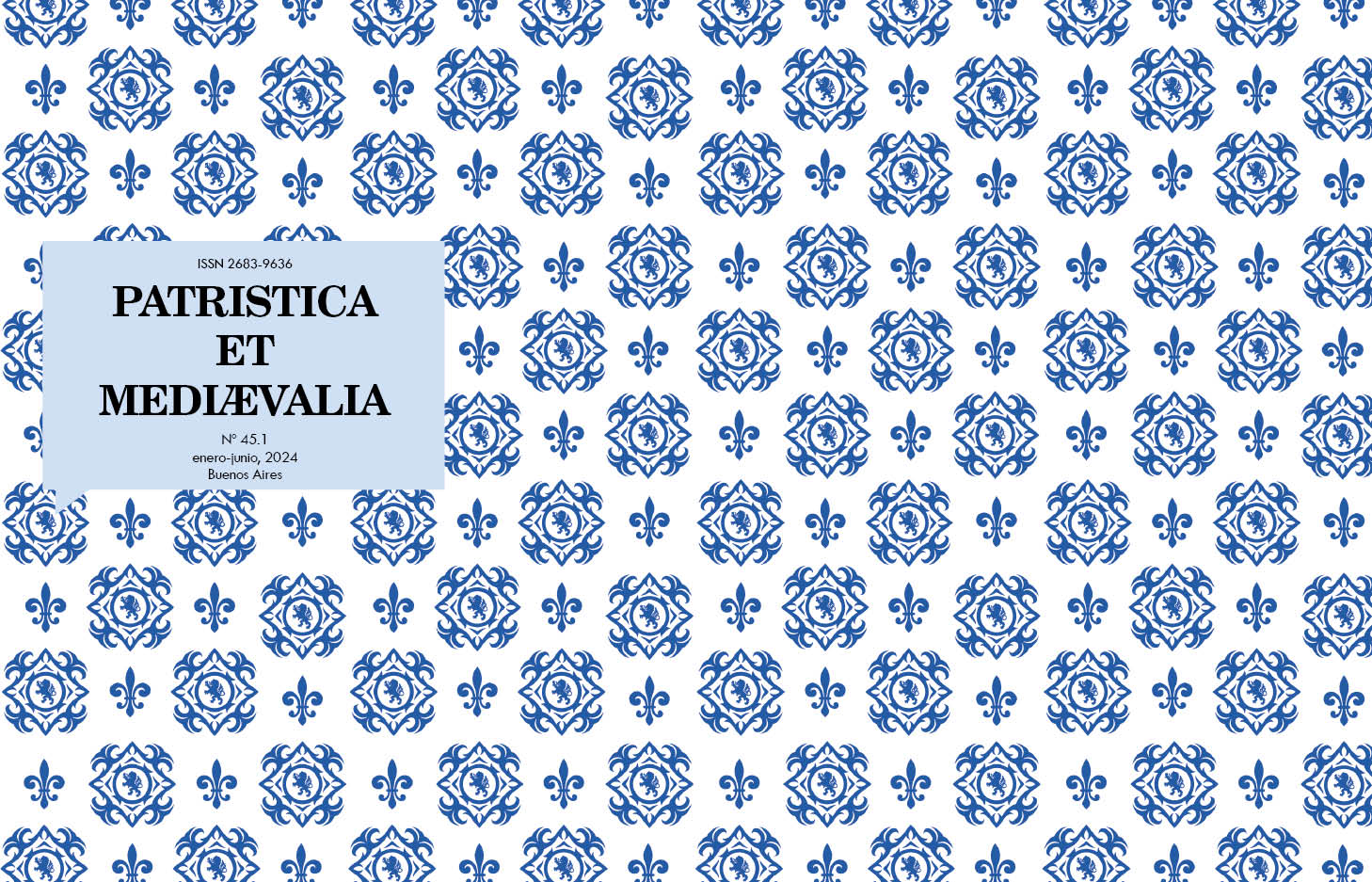Daemons, Cups of Forgetfulness and Eternity of the Soul in Irenaeus’ Adversus haereses 2.33-34
The Influence of Strato of Lampsacus in his View of Participation
Resumen
In Adversus haereses 2.33-34, Irenaeus rejects the Platonic view of the pre-existence of the soul, and his tale of a daemon who serves up the drink from the Lethe, the river of forgetfulness. Irenaeus’ argument appears in the context of a larger polemic against the Carpocratian view of education and recollection, so it appropriately draws from philosophical discussions on education and recollection. When Irenaeus’ opposes the Platonic myth, his argument reflects Strato of Lampsacus, a Peripatetic philosopher. I will highlight the parallels between them, particularly in their description of the soul as participating in life rather than being life itself, an affirmation that has created some contention within studies of Irenaeus’ theology. Finally, I suggest that this dependence in Book 2 of Adversus haereses continues in one of Irenaeus’s most famous descriptions of participation in haer. 4.20.5, for Irenaeus uses the same metaphor of light and the same verb as Strato. In addition to studying the parallels between Irenaeus and Strato, which has not been done yet, my main contribution is to suggest that Strato’s influence should be recognized in the famous Irenaeus’s view of participation.Descargas
Citas
Irénée de Lyon (1965). Contre Les Hérésies, Livre IV. 2 vols. Ed. Rousseau, A. Paris: Éd. du Cerf. (SC 100).
Irénée de Lyon (1982). Contre Les Hérésies, Livre II. Ed. Rousseau, A. and Doutreleau, L. Paris: Éd. du Cerf. (SC 294).
Irénée de Lyon (1982). Contre Les Hérésies, Livre II: Introduction, Notes Justificatives et Tables. Ed. Rousseau, A. and Doutreleau, L. Paris: Éd. du Cerf. (293).
Irenaeus of Lyons (2012). Against Heresies, Book 2. Ed. Unger, D. J. and Steenberg, M. C. New York: Paulist Press. (ACW 65).
Irenaeus of Lyons (2012). Against Heresies, Book 3. Ed. Unger, D. J. and Steenberg, M. C. New York: Paulist Press. (ACW 64).
Justin Martyr (1885) Dialogue with Trypho. Trans. Roberts, A. and Donaldson, J. Peabody, MA: Hendrickson. Reprint, 2012 (ANF 1).
Strato of Lampsacus (2011). Text, Translation and Discussion. Ed. Desclos, M. L. and Fortenbaugh, W. London: Routledge.
Tertullian (1885) On the Soul. Ed. Coxe, A. Clevland. Peabody, MS: Hendrickson. Reprint, 2012 (ANF 3).
Tertullianus (2010). De Anima. Ed. Waszink, J. H. Leiden - Boston: Brill.
Bacq, P. (1987). De l’ancienne à la nouvelle Alliance selon S. Irénée: Unité du livre IV de l’Adversus haereses. Paris: Éditions Lethielleux.
Behr, J. (2000). Asceticism and Anthropology in Irenaeus and Clement. Oxford: Oxford University Press.
Behr, J. (2013). Irenaeus of Lyons: Identifying Christianity. Oxford: Oxford University Press.
Briggman, A. (2019). God and Christ in Irenaeus. Oxford: Oxford University Press.
Briggman, A. (2012). Irenaeus of Lyons and the Theology of the Holy Spirit. Oxford: Oxford University Press.
Canlis, J. (2005). “Being Made Human: The Significance of Creation for Irenaeus’ Doctrine of Participation”, Scottish Journal of Theology 58.4, 434-454.
De Andia, Y. (1986). Homo Vivens: Incorruptibilité et divinisation de l’homme selon Irénée De Lyon. Paris: Institute d’Études Augustiniennes.
Fantino, J. (1994). La Théologie d’Irénée. Paris: Éd. du Cerf.
Gertz, S. (2015). “From ‘Immortal’ to ‘Imperishable’: Damascius on the Final Argument in Plato’s Phaedo”. In: Sylvain Delcomminette, P. and Gavray, M.-A. (eds.). Ancient Readings of Plato’s Phaedo. Leiden: Brill.
Grant, R. M. (1956). “Aristotle and the Conversion of Justin”, The Journal of Theological Studies 7, 246-248.
Grant, R. M. (1986). “Carpocratians and Curriculum: Irenaeus’ Reply”, Harvard Theological Review 79.1, 127-136.
Hort, F. J. (1923). “Did Tertullian use the Latin Irenaeus?”. In: Sanday, W. y Turner, C. (eds.). Nouum Testamentum Sancti Irenaei Episcopi Lugdunensis. Vol. VII. Oxford: Clarendon Press, pp. xxxvi-lvi.
Long, A. A. and Sedley, D. N. (eds.) (1987). The Hellenistic Philosophers. Cambridge: Cambridge University Press.
May, G. (2004). Creatio ex nihilo: The Doctrine of ‘Creation out of Nothing’ in Early Christian Thought. Worrall, A. S. (trans.) Edinburgh: T&T Clark.
Osborn, E. (2001). Irenaeus of Lyons. Cambridge: Cambridge University Press.
Otero de Santos, A. (1973). “Dos capítulos inéditos del original griego de Ireneo de Lyon (Adversus Haeresis II 50-51) en el códice Vatopedi 236”, Emerita 41.2, 479-489.
Rousseau, A. (1977). “L’éternité des peines de l’enfer et l’immortalité naturelle de l’âme selon saint Irénée”, Nouvelle Revue Théologique 99.6, 834-864.
Schneider, J-P. (2016). “Straton de Lampsaque”. In: Goulet, R. (ed.). Dictionnaire des philosophes antiques. Paris: CNRS éditions, 614-630.
Schoedel, W. (1959). “Philosophy and Rhetoric in the Adversus Haereses of Irenaeus”, Vigiliae Christianae 13.1, 22-32.
Schoedel, W. (1984). “Theological Method in Irenaeus (Adversus Haeresus 2.25-28)”, The Journal of Theological Studies 35.1, 31-49.
Simons, J. (2023). Divine Simplicity in the Theology of Irenaeus. Brill.
1. Los/as autores/as que publiquen en esta revista aceptan las siguientes condiciones:
-
Conservan los derechos de autor/a y ceden a la revista el derecho de la primera publicación, con el trabajo registrado con Licencia Atribución-CompartirIgual 4.0 Internacional, que permite a terceros utilizar lo publicado siempre que mencionen la autoría del trabajo y a la primera publicación en esta revista.
-
Pueden realizar otros acuerdos contractuales independientes y adicionales para la distribución no exclusiva de la versión del artículo publicado en esta revista (p. ej., incluirlo en un repositorio institucional o publicarlo en un libro) siempre que indiquen claramente que el trabajo se publicó por primera vez en esta revista.
-
Tienen permitido y se les recomienda publicar su trabajo en Internet (por ejemplo en páginas institucionales o personales).
2. Condiciones de auto-archivo. Se permite y se anima a los/as autores/as a difundir electrónicas la versión post-print de sus obras ya que favorece su circulación y difusión y con ello un posible aumento en su citación y alcance entre la comunidad académica. Color RoMEO: azul.













